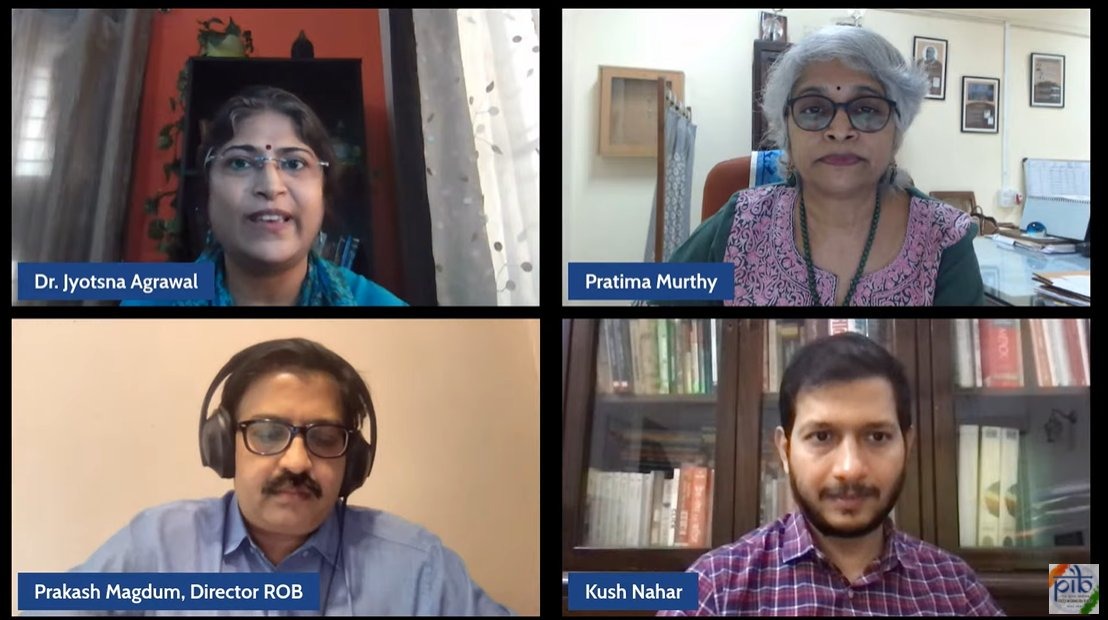Preponderant issue is that of fear, grief counselling is very important, compassion and empathy highly necessary during pandemic: Mental Health Experts
DELHI MAY 22, 2021:
The most important thing that we need to develop as a society is compassion and understanding. COVID-19 is a universal problem as all are suffering either directly or indirectly, stated the mental health professionals in a webinar today, on the topic “Finding the Light Inside: Mental Well-being and the Pandemic”. Jointly organized by the Press Information Bureau and the Regional Outreach Bureau, Maharashtra and Goa Region, the webinar’s expert panelists included mental health professionals from NIMHANS, Bangalore – Dr. Pratima Murthy, Head of the Department and Professor of Psychology and Dr. Jyotsna Agrawal, Associate Professor.
The mental health issues that a person infected with COVID-19 may face
Dr. Murthy stated, “The preponderant issue is that of fear”. The doctor explained that a whole lot of fear plays in one’s mind like what is going to happen, whether a hospital bed will be available, what will happen to one’s lungs and other organs – “a whole lot of fears”. Dr. Murthy also said, “If we take one step back, we know that out of every 100 people, 85 people just have a normal fever and other symptoms, which are usually self-limiting and most people get better”.
Secondly, there is so much information that one gets confused as to what to do. So, it is very important to get the right kind of information, advised the mental health expert.
Thirdly, a person who gets hospitalized or is in the ICU may develop psychological difficulties, may face depression, anxiety, have recollections of that very traumatic period. Similarly, family members of those in hospital or ICU may feel anxious about how helpless they felt, how they were not able to do anything. And of course, when you lose a person to COVID, that is possibly one of the most difficult psychological moments when you experience grief and bereavement. Further, there can also be mental health sequels after COVID infection, which includes, in addition to anxiety and depression, what is called ‘Long COVID’, a condition where people feel very fogged in their brain, not able to think clearly, have neurological symptoms. Stating these, Dr. Murthy said, it is important to be aware about some of these things, but at the same time, not to go into a panic in terms of responding to it.
Dr. Agrawal opined, some of the time, people are having this feeling of loss of control. People are losing jobs, having financial, emotional and other difficulties. At home too, various kinds of difficulties they are facing. Overall, a sense of questioning ‘what is this life?’ is being seen. A lot of questioning at the existential system is also arising in many people. They are questioning their belief system and the way they have lived their lives. All of these may make people feel numb or disconnected with what they are experiencing. And to cope up with that, people may take up many unhealthy pathways which can worsen the situation. So, the mental health effect of COVID has been huge, the doctor concluded.
Speaking about unhealthy ways of coping with mental health issues, Dr Murthy stated, lots of substance abuse has increased, be it alcohol, tobacco or other drugs. That is one of the concerns that we always certainly have during a pandemic.
What can society, community, friends and family do to de-stress and relax people who are going through mental health issues due to COVID-19?
The ways in which we can help includes making sure that people with COVID who cannot step out of their homes have food reached to them. We can make sure that we stay connected to them, reach out to them through calls or social media. There are people who are helping families with funerals, especially where the family is not able to go or does not have the wherewithal”, stated Dr. Murthy. People are reaching out in innumerable ways and that is where it helps to deal in a public manner with stress or grief around what we are seeing. This kind of collective response is very important. Being empathetic and understanding is also very important, suggests Dr. Murthy.
One of the important groups of people who are affected are the frontline workers, further added Dr. Murthy. Doctors and nurses may feel demoralised as they are seeing deaths day-in and day-out. Police personnel, ambulance drivers, people working in crematoria are also under tremendous stress. They also may face hostility and violence when things don’t go the way it is supposed to. “They all are facing tremendous stress. So, we need to acknowledge the role each one is playing to the best of their ability and support them in that role. A lot of peer-group support is also necessary in workplaces”.
Throwing light on yet another perspective of being helpful in such times, Dr. Agrawal stated, a factor that must be considered is one’s own personality in terms of how people may want to contribute to the society in such trying times. Some people may feel more comfortable in reaching out and do something in the world, some may want to do things in a one-to-one level. “We may do small things like just smile or call out someone who is unwell to check out how he or she is doing. We can all use our special qualities for other people. For instance, if someone is teaching art and craft to children online, it may be of immense use and joy to those children’s families. We need to be creative, kind to ourselves and aprreciate others for what they are doing. Bringing in those few moments of positive emotions or pleasantness amidst so much of pain and sadness will be helpful”, opines the mental health expert.
Connecting people who need help with those who want to help
Dr. Murthy said, it is very important to spread public awareness that people are not alone. There are some people who like their privacy, but they are not necessarily lonely people. However, loneliness at these times can be very troublesome. It is important to make people understand that there is a support network they can reach out to. On the other hand, people who are much more effusive and expressive should know how they can help themselves as well as reach out for help. “Connectedness and knowing where things are available is very important. In addition, all of us need to know how reasonably we can deal with loneliness, depression, and most importantly, grief”.
On a positive note, Dr. Agrawal said, “The amount of human goodness that is coming out in these times is amazing”. It is time to say that we are not isolated and that we are having these difficulties jointly and we also have to make people feel that it is all right to reach out and take help and also to give help, she added.
Mental-health issues arising in families due to COVID
Dr. Agrawal stated that many people who are working from home do not have clear-cut boundaries for the time devoted to work, family and so on. On the other hand, they are not able to focus on either as children, elderly and also spouses will be demanding more time. As a result, people will feel overwhelmed about the amount of demand which they have and also taking care of other people’s needs. An important thing is to have space for oneself also, not only physical, but emotional also. Maintaining harmony in these times would be a tough challenge. It is important that all people take care of their emotional health and regulate emotions.
Dr. Agrawal further said, “Now when people are not able to step out, they have a chance to remain connected through online mode, a resource that should be used judiciously so that there is both a sense of comfort and connection. On a positive note, families have a chance to stay connected now, which may not have been possible for a long time”.
Dr Murthy added that this is a time where family members are sharing chores. Hence, this is a time when younger children are learning to be responsible in some ways. These are times when relationships have been strained and conflicts can get amplified.
- We should understand that grief is a very normal process and that each person expresses it in different ways. Whether numbness, denial, confusion, anger, guilt, it can be overwhelming and is important to deal with it; restorative activities too are important. We are at a time when a lot of people have been bereaved, grief counselling is very important now, stated Dr. Murthy
Methods of dealing with mental health issues in times of COVID as suggested by the experts:
- Having a proper routine is more important in these times. This is one of the things on which we have control. Good diet, good sleep, good routines, adequate exercise, calming thoughts, learning coping strategies of identifying problems, solutions and also being able to reach out.
- We need to maintain sleep hygiene; sleep habits are extremely important, these should not be disturbed by activities one may find exhilarating.
- Check on self, take proper diet, remain hydrated and, most importantly, make sure that the oxygen level is monitored so that in case there is any problem, the person should get help.
- Grief counselling is a very important thing. We are at a time now when a lot of people have been bereaved, have undergone tremendous losses. It might be relationship losses, financial losses. Grief is an overwhelming emotional response. Helping people through this is very critical.
- Children should stay connected, develop hobbies, help out others, be innovative and creative in whatever they can do.
- Build meaningful connections that give you sense of purpose helps a lot.
- Developing attitude of gratitude for what you have is another way of coping with stress.
- Keep a worry journal or worry box where you jot down worries and put those chits, instead of carrying them in your mind. It will help you to focus more.
- Asking for support can help one under trauma.
- Not replacing negative thoughts by positive thoughts, but trying to instil realistic thoughts help. It is also important to be kind to oneself, to let negative thoughts be there
- Remember that all of us are in this together.
- Society and the system needs to step up their support for frontline workers.
- We need to use technology in an appropriate manner. Mobile phone, digital connectedness, woman technologists have helped us greatly; at the same time, we need digital distancing as well
- It is important to distract yourself by doing things you enjoy. Yoga, music, connecting with others and breathing exercises may help us to become relaxed.
- Select news sources which are factual, cut down on other sources which are negative and non-factual which make you worried.
- Positive psychology needs to be given more emphasis by journalists.
- Connecting with one’s spiritual side also helps many people to cope up with such difficult times. Scriptures can help to cope with death and loss.
- If depression is going on for more than two weeks or so, if a person is not eating, losing weight, crying all the time, feeling guilty, that’s a time when you possibly need to make a person seek professional help.
- If panic attacks become so overwhelming that a person cannot function at all, inspite of trying self-help, it’s important to get help.
- Knowing where to take people with pre-existing mental health problems is very important. For them, a regular follow-up with their regular mental health professionals and support network would be very helpful in these times as such patients can decompensate in such times.
- A child who has lost both parents to the disease needs to feel a little cared for and anchored. If the child’s daily activities are hampered, seek professional guidance for the child. These are abnormal times, if the child is getting seriously affected, affecting his daily activities. It may be advisable to take professional support, depending on the child’s age.
- Call NIMHANS toll free helpline 080-46110007, for psychosocial support. Every State/UT has its helpline. Reach out for support whenever you need help.
- Systems everywhere has to step up, give more importance and value to mental health, devote more resources. Making institutional policies on mental health is very important. Psychological support for employees is extremely crucial, apart from having testing and treatment facilities, referral networks, peer-support among other things. In times like this, apart from the COVID wave, we are facing multiple waves of mental health crisis. One moment people might be feeling numb, the next moment they may have a mix of emotions. This happens after every crisis affects the community, as shown by many researches. That is why it is very important to create resources for mental health at a policy level.
- NIMHANS has brought out a small manual for healthcare workers which can be accessed at:https://nimhans.ac.in/wp-content/uploads/2021/04/FHW-Manual-Final.pdf

 हिंदी
हिंदी






